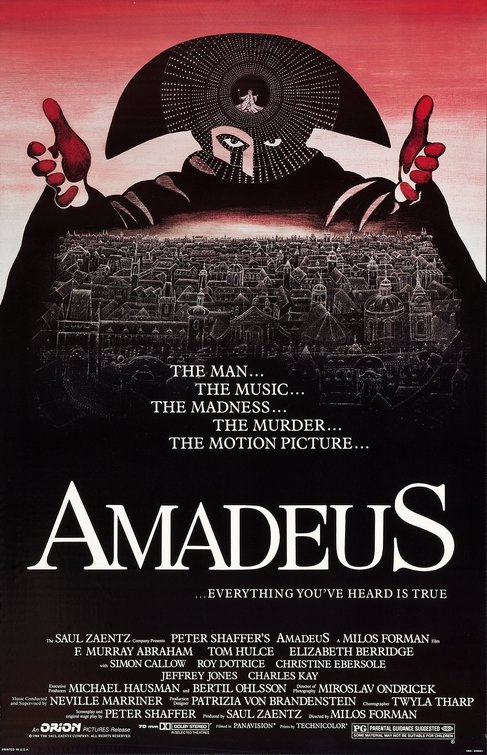Amadeus (1984) is a film adaptation of Peter Shaffer's stage play of the same name depicting the fictional story of the life and death (or rather, murder) of Wolfgang Amadeus Mozart. Narrated from the view of Antonio Salieri, another famous composer of the time, we are taken through a journey of worship of music, of growing hatred and jealousy and the growing madness.
Salieri and Mozart: The Cain and Abel of Music
Towards the end of the film, it occurred to me that while disturbing in its notion of committing murder due to envy, was not unfamiliar. It resounded to me the biblical tale of the first murder committed- the murder of Abel by Cain, his brother.
Like Cain who served God through the offering of the fruit of his fields, Salieri wanted to serve God through his music; and in return he asked for fame, recognition and love from the world. He even went as far as offering everything he had: his industry, his chastity and his utter humility. Yet also like Cain, it seemed that his offerings were not pleasing and accepted and God instead blessed Mozart with the true talent of music, to create music to perfection in its first draft, of composing the "voice of God" through music.
Cain, in his envy of Abel whose offerings were accepted and whom was blessed by God in return, grew to hate him and one day, killed him out in the fields. Similarly, Salieri saw Mozart as the unrightful vessel of God and in turn decided to scorn God and plotted to murder Mozart. While not directly killing Mozart, Salieri was responsible for taking away Mozart's chances of fame and financing his livelihood, plunging him straight to the depths of debt, alcoholism and hard labour, eventually driving Mozart to his deathbed.
Following the Frustration theory of Aggression, which states that aggressive behaviour occurs in response to the aggressor's growing frustration resulting from the hindrance or block that prevents them from achieving their goals. Applying this theory to Salieri whose goal was to become a world famous composer and have his music remembered and loved forever, he grew frustrated when Mozart came to Vienna and gained popularity quickly.
In his mind, God had blessed Mozart to be His instrument and so, in order to finally achieve his goals he would have to get rid of Mozart by killing him.
However in the end, Salieri narrated that God punished him for killing Mozart, by allowing him to live for years with guilt in his heart and with each passing year, Salieri watched as his music faded into the background while Mozart's music gained popularity, revealing itself to become the timeless masterpieces that they still are even now. Similarly to Cain, who was given the 'mark of Cain', he had to live the rest of his life in shame and guilt of what he had done to his brother. Unlike Cain however, who sought after God's forgiveness, Salieri chose to make God responsible for the murder of Mozart and even proclaim himself to be the "saint patron of mediocrity", taking religion into his own hands to absolve mediocrities everywhere.
Like Cain who served God through the offering of the fruit of his fields, Salieri wanted to serve God through his music; and in return he asked for fame, recognition and love from the world. He even went as far as offering everything he had: his industry, his chastity and his utter humility. Yet also like Cain, it seemed that his offerings were not pleasing and accepted and God instead blessed Mozart with the true talent of music, to create music to perfection in its first draft, of composing the "voice of God" through music.
 |
| Aptly baptized with the name "Amadeus" which means "Love of God", Mozart composes music that Salieri describes as the "voice of God" |
Following the Frustration theory of Aggression, which states that aggressive behaviour occurs in response to the aggressor's growing frustration resulting from the hindrance or block that prevents them from achieving their goals. Applying this theory to Salieri whose goal was to become a world famous composer and have his music remembered and loved forever, he grew frustrated when Mozart came to Vienna and gained popularity quickly.
In his mind, God had blessed Mozart to be His instrument and so, in order to finally achieve his goals he would have to get rid of Mozart by killing him.
However in the end, Salieri narrated that God punished him for killing Mozart, by allowing him to live for years with guilt in his heart and with each passing year, Salieri watched as his music faded into the background while Mozart's music gained popularity, revealing itself to become the timeless masterpieces that they still are even now. Similarly to Cain, who was given the 'mark of Cain', he had to live the rest of his life in shame and guilt of what he had done to his brother. Unlike Cain however, who sought after God's forgiveness, Salieri chose to make God responsible for the murder of Mozart and even proclaim himself to be the "saint patron of mediocrity", taking religion into his own hands to absolve mediocrities everywhere.



No comments:
Post a Comment